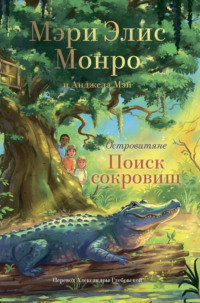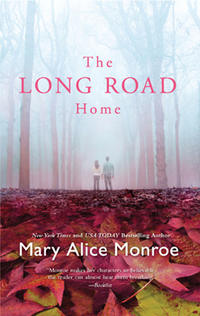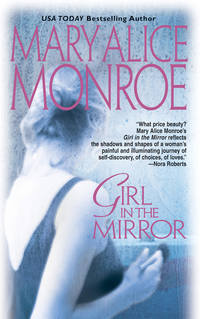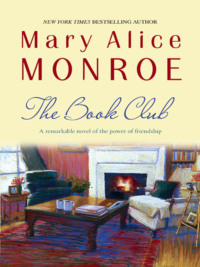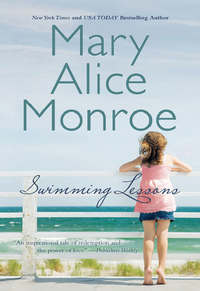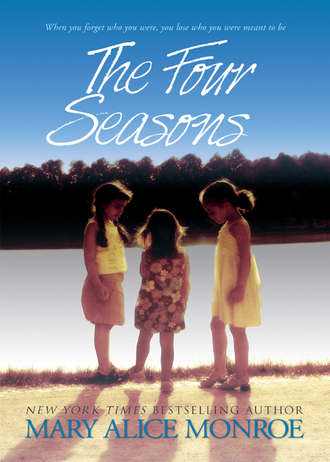
Полная версия
The Four Seasons
“What about the letter?” Rose asked after a moment.
“Oh, yes,” Mr. Collins said. He held the letter in his hand. “It’s sealed. Who would like to open it?”
“I would,” Rose said, reaching out across the floor for it. Mr. Collins delivered it into her hand. She held the envelope reverently, smoothing one palm over it in a tender stroke. “I knew she had gone to Mr. Collins’s house, of course, just as I knew what was troubling her, though I hadn’t seen the video before.” She smiled sadly. “Merry could be very secretive when she wanted to be. Thank you, Mr. Collins. It was very moving. We’re not much of a family for taking videotapes and I believe this is the only record we have of Merry. It was so powerful to see her and hear her speak.” She paused, collecting herself.
“But I know what is in this letter,” she continued after a moment. “It’s in her own handwriting. She worked quite hard at it.” A faint smile crossed Rose’s face. “She tossed out quite a few until she was satisfied.”
“Why don’t you read it?” Birdie said.
Rose opened the envelope with her finger and tugged out a piece of stationery of matching print. Smoothing out the paper, she glanced briefly at Jilly, then cleared her throat. “It’s dated March 5, 1999.”
“That was a month before she died,” Birdie said.
“That’s right,” Rose replied, then raised the letter. “There isn’t much….”
Dear Jilly, Birdie and Rose,
Under my bed is the time capsule. You gave it to me. Please give it to Spring. Please give all my money to her, too. She needs a nice house.
Your sister,
Merry
P.S. You have to find her first.
“That’s it,” she said, folding the letter back.
Jilly rubbed her temples, then leaned forward and said, “Excuse me, but am I the only one missing something here? There’s that name again. She used to ask me about her. Who or what is Spring?”
“Isn’t that the name of her doll?” asked Birdie. “The one that she’s had forever. Oh, you know the one, the baby doll with the red hair? She used to carry it around with her wherever she went.”
“Yes,” replied Rose. “The doll’s name is Spring. But that’s not who she’s referring to.”
“Why keep us in suspense? Is she some friend? Real or imaginary or what?”
Rose looked to Mr. Collins for support. He nodded, indicating she should continue. Rose wiped her palms on her thighs. “Jilly,” she began in earnest, then stopped.
Jilly sat still and frozen, as though posing for a photograph.
Birdie searched Rose’s face, so intent and yet fearful. She looked finally at Mr. Collins, whose gaze was all-knowing.
“Well, surely it can’t be all that serious,” Jilly said in a glib manner. “Dolls and time capsules are hardly earth-shattering.”
“Please believe that this is not meant to hurt you or invade your privacy in any way, shape or form,” Rose said. “Merry loved you, in some ways I believe more than she loved any of us. You were always someone, well, exotic. Special. She talked about you all the time, and oh, she loved your movies. She didn’t understand the Italian, but she watched them two or three times a week just to see you.”
“That’s very nice, but what does this have to do with Spring? Am I Spring? She wanted me to come home? Is that it?”
“Not exactly.” Rose sighed, resigned. “This is so hard.”
“Rose…” Birdie urged.
Rose nodded. “I’ll just tell you everything straight out and then we can talk, okay? That’s the trouble, actually,” she said as an aside. “No one ever talks in our family. If we had…Well, never mind.”
Rose looked directly at Jilly. “The fact is, even though no one ever talked about it openly, Jilly, we all knew where you went in 1973. We didn’t know the details back then, of course. Mother made up all those stories and we were in a fog. But we knew you went somewhere to have a baby.”
Jilly went ashen, her only movement the rising of her hand to her throat.
Birdie put her fingers to her lips, stunned, and furtively studied Jilly’s reaction.
Rose took a breath, then pushed on. “Even Merry knew. I don’t know how she figured it out, but she always did have a knack for ferreting out the truth. This is a big house, but not so big that whispers at night are not heard, or crying behind closed doors, or angry fights between you and Mom and Dad.”
Jilly clutched at the arms of her chair, digging her nails into the soft, worn upholstery. Her voice was cold and demanding. “What do you know? Exactly.”
Rose looked into her eyes with sympathy and spoke clearly. “Back then, not much. I was only eleven and Merry was six, so we weren’t in on the details. Birdie wouldn’t talk to us about it. Later we did, naturally, but not then. And, of course, Mom explained things to me, many years later.”
She paused to give Jilly a chance to speak, but when she didn’t Rose pushed on.
“The point is, Merry never truly understood what really happened. All she knew was that you went away to have a baby. She latched on to this, though none of us knew it at the time. If we did, I’m sure Mom would have tried to explain things to her right away. So when you came home without the baby, she was confused. Actually, she was really upset. She cried night after night for that baby. Do you remember?”
Jilly said nothing.
“I remember vaguely,” Birdie commented. “There was a lot going on and everything was tense. I guess we all thought Merry was crying in response to that.”
“When Mom finally figured out that she knew about the baby,” Rose continued, “she was thoroughly flustered. She gathered all of us for a family meeting and put the fear of God into us, telling us never to talk about it. Not even to one another. She told us that’s how reputations are ruined and so on.”
“That’s when Mom bought her that baby doll,” Birdie added. “I think she did it both to calm Merry down, and to use it as an excuse if Merry started talking about your baby.”
“But she never did,” said Rose. “Except to me, and I always told her never to discuss it with outsiders. You heard her on the tape. Since the baby was born in spring, she called the doll Spring. You know how Dad nicknamed us after the season we were born in. I guess she wanted the doll to be named like the rest of us. But I knew, and Mom knew, that she had really called your baby Spring. The doll was just a substitute.”
Rose rubbed her arms and looked off into the distance. “It’s odd, but by giving the baby a name, I think we all could settle it in our minds. I mean, the baby became real. It wasn’t just another one of our games. But while we moved on with our lives, Merry clung to her belief that Spring was out there somewhere—with you, Jilly. And when you came home again without the baby, she was very upset. She thought Spring was somehow lost and needed us.”
Jilly’s face was white, her back straight against the chair. She stared at Rose for a moment, shell-shocked, as though trying to comprehend all that she had just heard.
“But I don’t understand,” Birdie said, wrinkling her brow. “What does this have to do with the letter and the videotape? She wants us to find the real Spring? The baby Jilly gave up for adoption?”
“Yes,” Rose replied.
“But…but why?”
“She wants us to give Spring the time capsule. And her money.”
Jilly put her palms to her face. “Oh, God.
It didn’t take Birdie long to put things straight in her mind. “But that’s ridiculous! Give more than half a million dollars to a stranger? That’s our inheritance. To be divided three ways. I’m sorry, Jilly, but I have a child, too. Doesn’t she figure into the equation?”
“She didn’t mean the house money, just what’s left of her trust fund. She didn’t have a firm grasp of money but she knew she had some in the bank. Besides, she was mostly interested in our finding Spring,” Rose explained.
“Mr. Collins,” Birdie said, “legally speaking, Merry wasn’t mentally competent, was she? That letter won’t be viewed as a codicil or a will?”
“It could be, but I wouldn’t worry about that.” He put out a quieting hand to ward off any worries. “As I said at the onset, in my opinion, Merry was not legally competent. But if any one of you argue that she was—” he looked at Rose “—her letter would have to be contested as to its legal bearing. I doubt the courts would support it. I only presented her request to you because she wanted very much for me to do so. And now I have.”
“Rose, I can’t imagine why you encouraged her in this,” Birdie huffed. “What were you thinking?”
“I didn’t encourage her, but neither did I discourage her. Like it or not, Birdie, this search for Spring was Merry’s wish.”
“Well, it’s not mine.”
Everyone looked over at Jilly, startled by the cool, harsh tone of her voice. She’d been so quiet, almost forgotten in this discussion.
“I’ve had quite enough of this talk about searching for Spring as though it was Merry’s baby,” she said in measured tones. “She had a doll. Let’s keep that firmly in mind. As concerns the, the…other,” she spat out, grasping for a word that was impersonal, “that decision is mine and mine alone. And I won’t do it. Do you hear me? I won’t do it. And neither will anyone else. I forbid it. You have no right,” she said to Rose. “Merry had no right to bring it up. It’s my history and none of you have any idea what I went through. And I’ll be damned if I dredge it all up again just to satisfy your perverse curiosity or to appease the nonsensical rambling of my sister. That part of my life is closed. Over. There is no Spring.”
Jilly’s eyes were flames in her thin, pale face as she sat regally and glared at them, daring them to challenge her. Rose put her hands to her trembling lips. Birdie folded her hands together.
Mr. Collins put his hands behind his back and said with admirable calm, “We quite understand.”
Jilly lowered her shoulders, appearing older and inexpressibly weary, eager to be gone. She slowly rose with as much dignity as she could muster, then hurried from the room. A moment later they could hear her bedroom door slam.
“Well…” Birdie said, exhaling and unbuttoning her suit jacket.
“I was afraid that would happen,” Rose said.
“What did you expect? How could you have done this to her? Do you have any idea what she went through back then? The decision to search for an adopted child has got to be one of the most painful, not to mention personal, decisions a woman can make. It’s one thing for Merry to go on about her doll and her idea of a lost baby, but it’s quite another to couch it in terms of a last request.”
“But that’s exactly what it was,” Rose exclaimed, rising to her feet. “I knew this would cause a furor, but who was I to deny her? Birdie, you always saw Merry as someone broken who needed fixing. Something half and not whole. Just another responsibility. And as for Jilly…Who knows? I love her, but I haven’t seen her but a few times in twenty years. She never made the effort to get to know Merry. Merry was a rare, beautiful individual. She was my dear friend. And when my sister, my friend, begs me to make a last request to her sisters, you better believe that I’m going to do it.”
“Well, good for you,” Birdie snapped back. “Except did you consider the consequences?”
“As a matter of fact, I did.” Rose lifted her chin and squared off with Birdie. “I’ve spent a lifetime in this house. I was the one who left college to stay here and take care of Merry. I watched you and my friends get married and have children, have lives of your own while I watched the years go by. I don’t need you to tell me about consequences, thank you very much.”
She paused to collect herself. “You forget that I was Mother’s caretaker, too, and when she drank, she liked to talk. I know every dirty little secret that’s been swept under the rug, and frankly I think it’s time to clean house. We have to, or we’ll let it fester and rot. Our parents are gone. Merry is gone. There’s nothing left to hold us together, to force us to keep contact. It’s time for us to talk, at last.”
Birdie rubbed her eyes. “I’m not sure that’s always for the best.”
Mr. Collins stepped forward to stand between them. “I think it’s time that I go. Whatever you decide, on this issue or concerning the house, is strictly up to you. However, my course as executor of the will is clear. The money and the property will be distributed equally among you as stipulated in your father’s will. If I hear otherwise, then we’ll have to have legal documents drawn up. Certainly, you don’t have to make those decisions tonight. I suggest you sleep on it. Goodbye, Birdie. Rose. Please extend my sympathy to Jilly and tell her that I regret any pain she has experienced.”
“I will,” Birdie said, rising to take his hand. “Let me walk you to the door.”
Rose brought him his briefcase. When she handed him the video, he shook his head.
“No, that’s for you to keep. You may want to watch it again.” He paused and his gaze swept the living room. He appeared lost in thought, as though seeing ghosts of a happier time long gone.
“It was a difficult decision for me to agree to Merry’s request,” he said. “Highly unusual, needless to say. I feel sure that if you look at the tape again you will see that Merry had only love in her heart for all of you when she made her request. Oh, that reminds me.”
He bent to open his briefcase. His long hands, pale and gnarled with age, pulled out a child-size shoe box. It was brightly painted and wrapped with tape, over and over again, creating a tight seal.
Birdie recognized the box immediately and held out her hands. “The time capsule,” she said on a breath.
“Quite right,” he replied. Then, handing it to her, he said in utmost seriousness, “As co-executor of the will, I hand it over to your care. It is my client’s wish that it be delivered intact to Spring, should you find her. I assume you know its contents.”
Birdie shook her head, accepting the small box with reverence. “No. At least not all of it. You see, we gave it to Merry as a gift when she came home from the hospital after the accident.” She paused as a million memories of her childhood flooded her thoughts. “My, I can’t believe it’s still here. It was so long ago, I’d forgotten all about it.”
Rose stepped closer, wrapping an arm around Birdie’s waist. “It was supposed to be very private so we each gave our gift to Mom to put into the time capsule. It was a very big deal, rather ceremonial. She’s the one who put everything in the box and sealed it with all the tape.”
“You’ve never opened it?” Birdie asked Rose.
“Of course not,” she replied. “It didn’t belong to me. It belonged to Merry.”
Birdie wondered if she would have been so noble. She suspected curiosity would have gotten the better of her over the years.
“This time capsule is a piece of our childhood,” Birdie said, holding it with a trace of wonder in her voice. “And now it belongs to Spring.”
6
AFTER MR. COLLINS LEFT, Dennis walked lethargically down the stairs. He’d removed his jacket and tie and in his hand he carried a pile of papers.
“Is the coast clear?” he asked.
Seeing him obviously so self-engrossed in his own world did nothing to improve Birdie’s mood. She was tired and emotionally drained and she blamed him for not being there for her.
“Where were you?” Birdie asked sharply.
Dennis halted on the stairs and slapped the papers against his thigh. His face could look very cold when he tried. “Where do you think? I was upstairs grading term papers. I told you a hundred times that I had work to do.”
Rose grabbed her coat from the front closet. “I’m going for a walk,” she said, making a hasty exit.
“You always have work to do,” Birdie countered.
“What do you mean?” he asked defensively. “You make that sound like a criticism, like I’m having a ball upstairs drinking beer and watching a football game. I was upstairs working. Where should I have been?”
“Maybe with me, in the dining room, during the reading of the will.” She knew she sounded bitter but couldn’t help it. Why did he even have to ask? Turning on her heel, she marched through the living room, picking up dishes en route to the kitchen.
Dennis followed her, tucking his hands in his back pocket. “That was Season family business,” he said after the kitchen door closed. “Between the sisters.”
“You’re family,” she said through tight lips, tying on an apron.
“If you wanted me there, all you had to do was ask,” he said, reaching to pick up empty bottles from the kitchen table and carrying them to the sink.
“Why do I always have to ask?” She turned on the water faucets with brisk turns. “Can’t you see for yourself when I need you? And you ducked out of the luncheon pretty quick, too.”
“You know how I hate those affairs.”
“Oh, and funerals are happy affairs for the rest of us?” She turned off the water and dried her hands. Behind her, he moved around the kitchen, putting the bottles and cans into a plastic bag for recycling. The clink of glass against glass sounded in the silence.
“Mr. Collins and Rose hit us with a bomb today,” she said in a softer voice, “and it would have been nice to have had a little support.”
Dennis nodded, acknowledging her change of tone as much as her words. He lowered his own tone. “What did they say?”
“You won’t believe it.” She turned to face him. “Merry wrote this letter to all of us, and made a video.”
“A video? That’s rather macabre.”
“It was. But then in it, she tells us this…this last request. She wants us to search for—Are you ready for this? For Jilly’s baby.”
Dennis spun his head around to face her, shock registering on his face. “You’re kidding?”
“I am not.” She flattened her hands on the counter and leaned forward, pleased to see his reaction.
Dennis went to the fridge to pull out a beer. He was lost in his own thoughts. “What did Jilly say about all this?”
“It came as a shock. At first she just sat there with this stunned expression, like a bullet had zipped through her brain.”
“Yeah, I’m not surprised.”
“Then Rose went on and on about how Merry knew about the baby all along and had been wondering about it. I never knew that. It’s hard to imagine her remembering, much less caring about it enough to make it a dying wish. Jilly never knew any of us even knew about it.”
“God, what a shock.” He looked away and said in a distant voice, “I’m sure she considered that part of her life closed.”
“I’m sure, too. We all did. Except deep down, I know Rose was right. It was never really settled because we never openly talked about it. Jilly just sat there and listened. When she finally did speak she was furious. Not yelling or such, but controlled—and maybe scared. In any case, she won’t have us conducting a search for the child she put up for adoption.” Birdie paused and put her hand to her cheek. “Listen to what I just said. The child Jilly put up for adoption. Do you have any idea how many years those words were whispered? And then only behind closed doors?”
Dennis tilted his head and squinted his eyes in thought. “She shouldn’t search. She has her life and the child has hers. She shouldn’t shake things up.”
“I don’t think that’s a big issue these days. Oh,” she exclaimed, “but that’s not all. Apparently, Merry wanted us to give this Spring her money, too.”
“The whole estate?”
“No, Rose seems to think she meant the twenty thousand she had left in her trust fund. Jilly was ticked off about that, too. I can’t figure it out. She’s got oodles of dough, so why is she so uptight? The one you’d think would care about money is Rose. She hasn’t got a dime, but she’s the one who wants to give the money away. There’s no need to be greedy. We’ll all have more than enough after the house is sold.”
“How much do you think the house will fetch?”
“I don’t know. Over five hundred. Maybe more.”
He considered this as he took a long swallow from the bottle. “We could take that trip we’ve always talked about,” he said, leaning back against the counter.
“To Italy?”
His eyes warmed. “Yeah. Just you and me. No agenda, no phone calls to make or chores to get done. The biggest decision we’ll have to make is what to eat for dinner. In fact, we’ll starve ourselves for weeks before we leave, then eat our way through the country.” He moved closer, wrapping his arms around her waist. “We never got a honeymoon. We need time, Birdie. Just for us.”
She nodded her head and leaned into him. “I know.”
He hugged her and she thought she really did know. Especially at moments like this, that harkened back to a time when they were close and intimate. When they touched a lot and each touch set off a fire between them that had them having sex like rabbits. Back to when they’d thought of each other all day long and missed each other every moment they were apart. That all seemed so long ago. For years they’d promised themselves a trip. It was a dream that served as a lifeline during the rough years of juggling her medical residency and Hannah’s early childhood. Then came the start of her medical practice and his acceptance to the faculty at the University of Wisconsin. As the years passed, the dream slipped farther and farther away. Now they were floundering.
Something was very wrong between them, something they couldn’t put a name to. They were cohabiting space, more like roommates than husband and wife. She knew she snapped at him a lot. She couldn’t help it; he irritated her so often, more than anyone else. It was almost as if he did it deliberately, to get her attention.
Or maybe it was just that after twenty years, they were both getting a little too familiar with each other’s habits and flaws. He was pretty good at getting his digs in, too, and he excelled at tuning her out. But she never questioned that she loved him. He was her husband. The father of her only child. Her friend.
He nuzzled at her ear suggestively, and all she could think was how she didn’t want to be touched.
“We’re both tired,” she said, pulling back, pretending not to notice the stark disappointment in his face. “Why don’t I make us something to eat and we’ll plop in front of the TV.”
“Why do you always do that?”
“Do what?”
“Break away whenever we get close?”
She laughed nervously. “I don’t!”
“Yes, you do.” He was utmost serious.
Birdie’s face grew somber. “I don’t do it to hurt you, and I do want to be close to you, it’s just…Lately, I don’t want to make love and I know you do. I don’t know why. Maybe it’s hormonal.”
“Maybe,” he replied. Dennis picked up the bag of empty bottles in a swoop. “But it’s not been just lately. It’s been a long time, Birdie. Too long.” He turned away, then headed to the back door.
Birdie felt the space lengthen between them as she looked over her shoulder to watch him leave. The empty bottles clanked against his leg as he walked out from the house. It was a hollow, lonely sound.
The snow had melted under the day’s warm sun so Rose was able to walk easily along the sidewalks of her neighborhood. Hers was a block like many others in the country and she knew each house and yard almost as well as she knew her own. She noted where one neighbor had pruned the front hedge, or another was beginning an addition. Most of the houses were well cared for, even lovingly so. Passing by she could peek in the windows overflowing with light and see typical American family scenes being played out. These houses had a feeling of family and cheerfulness that was warm and inviting.
When she’d arrived back at her own home she remained on the sidewalk, her coat collar up close around her neck and her small hands tucked tightly under her armpits. She tried to look at the Victorian with the same dispassionate eye she’d looked at the neighboring ones. Mrs. Kasparov’s list of flaws came to mind, and though it rankled, they were all too true. On the block, their house was the eyesore, the shabby one that prompted neighbors to say, “What a shame. If only they would fix it up.” It was a shadowy, melancholy house that sat on a huge double lot on the corner, hidden by overgrown pines and a forest of shaggy shrubs. Light flowed through torn shades or missing blinds, adding to the somber sense of depression.




